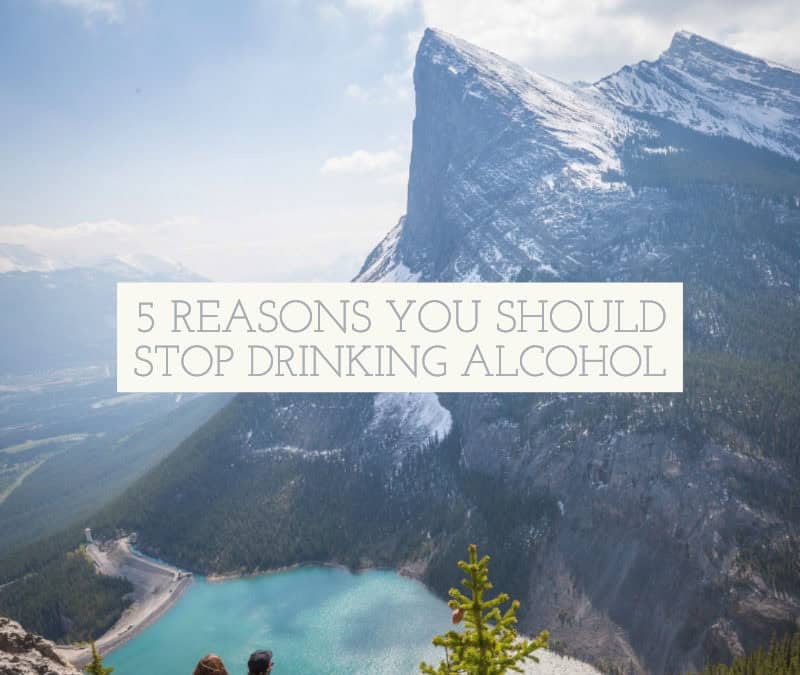
by Paul Churchill | Mar 28, 2019 | Blog, Helpful Tips, Resources, The first Year
I was completely ignorant of how beneficial giving up alcohol would be to the overall quality of my life. After all, alcohol became me. I spent a huge chunk of my life intimately interacting with alcohol, completely isolated from any other solution. When I was first introduced to recovery, a life absent of alcohol, I wasn’t convinced that it was for me. Fear crept in and I rebelled against the idea of letting go of my vice. Until one day, the pain I was experiencing was far greater than my fear of change. First, I had to admit to my innermost self just how detrimental my drinking had become and the magnitude of the harm I was causing myself and others.I was pleasantly surprised to find that giving up alcohol enhanced my life so much more than I ever could’ve imagined.
If you are unconvinced and on the fence about sobriety, let me be the first to assure you that things will only get better. What’s the worst that can happen? You may face conflict and resistance at first. Once you get over the initial slump, I can assure you, your life will approve drastically once you reach the other side of alcoholism. Here are 5 reasons you should stop drinking alcohol.
Health Improvement
One of the most obvious reasons you should stop drinking is because of the direct negative effects of alcohol abuse. Heavy drinking increases your risk of obesity, diabetes, cirrhosis, kidney failure, and heart disease. When you make the decision to stop drinking alcohol your overall health wellbeing will improve in a multitude of areas:
-
Brain: A recent study suggests that as little as two weeks, of sobriety, can reverse and even heal damaging effects of alcohol on the brain.
-
Heart: Abstinence from alcohol will decrease your chances for developing high blood pressure and your risk for heart attack or stroke.
-
Skin: Alcohol is a potent diuretic. When you stop drinking alcohol, your skin’s elasticity will return as you naturally become more hydrated.
-
Weight: The calories found in alcohol are void of any nutritional value, but rather are filled with empty calories. Your appetite will soon return and you will consume nutritional foods rather than consuming unhealthy sugars.
Emotional Stability
Alcoholics spend most of their lives trying to numb all emotions with alcohol. When you stop drinking, your emotions may be all over the place. In fact, I had a hard time even identifying my emotions when I first got sober. Eventually, that changed. Consuming alcohol can lead to incomprehensible demoralization, which ultimately ends in guilt and shame. Absent from alcohol, guilt is eliminated. Quitting alcohol can relieve symptoms of anxiety, depression, encourage longer/deeper sleep, and overall stabilize mood.
Financial Freedom
When I was drinking, life was tough. Not only was I spending way too much on alcohol, but I evaded any/all financial responsibilities. Eventually, I wasn’t able to be much use at work either. Without alcohol, you are able to be a productive member of society. The money spent on alcohol can be spent on repaying old debts and current bills. Financial freedom comes, once you put down alcohol.
Mental Clarity
Mental clarity, memory, and focus are seriously impaired when under the influence of copious amounts of alcohol. The benefit of not drinking alcohol will directly impact your mental clarity. I don’t know about you, but the mental fog I experienced on a daily basis created many problems for me. My memories were skewed, my thinking was delusional, and I couldn’t focus on any task that didn’t involve drinking more. When you give up alcohol, the fog is lifted. One study followed a group of men and women with at least 6 months into their sobriety. Researchers were unable to distinguish any cognitive differences between the recovering drinkers and the non-drinkers.
Quality Relationships
One of the most meaningful benefits of my sobriety is the quality of the relationships in my life today. Truth be told, when I was drinking I was unable to maintain any healthy relationship. I had an unhealthy love affair with alcohol. I was a horrible friend, daughter, mother, and human in general. I preferred isolation over engaging in interpersonal relationships. When you quit drinking alcohol, the veil is torn away. You may find acceptance of relationships that have been damaged, beyond repair. Communication doesn’t ignite fear but rather it becomes a healthy necessity. You are able to make healthy choices and mend broken relationships
When you first stop drinking, you may feel like a total train wreck. (That’s how I felt) It didn’t take long before all of the promising benefits of sobriety, started to become my reality. I’m not sure I ever experienced the mental, physical, spiritual, and emotional freedom prior to getting sober. Without the commands of alcohol shackling you to self-propelled misery, the world is your canvas. When you decide to stop drinking you get the opportunity to live a life beyond your wildest dreams.
This is a guest post from Tricia Moceo who is an Outreach Specialist for Recovery Local, a local addiction/recovery-based marketing company. She advocates long-term sobriety by writing for websites like detoxlocal.com, providing resources to recovering addicts, and shedding light on the disease of addiction. Tricia is a mother of two, actively involved in her local recovery community, and is passionate about helping other women find hope in seemingly hopeless situations.
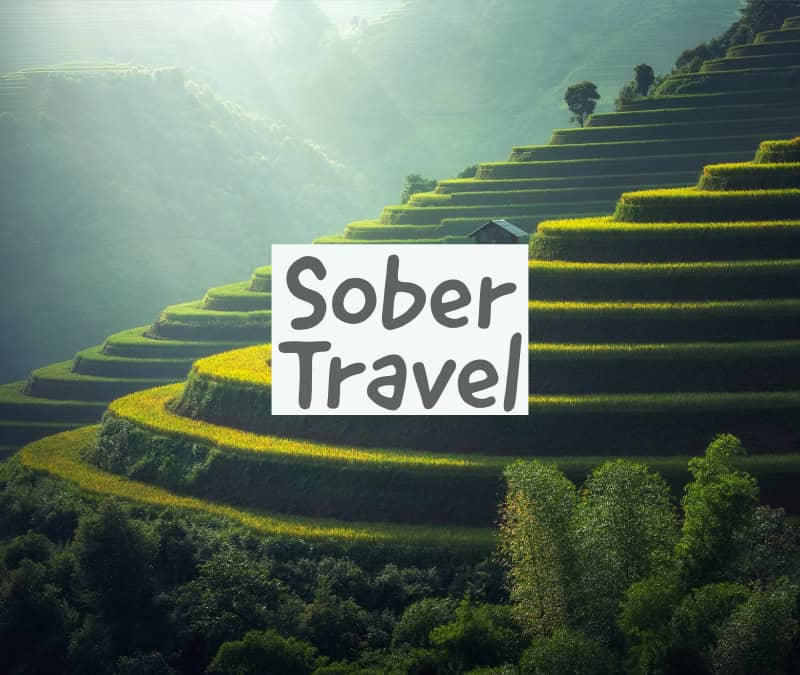
by Paul Churchill | Jan 22, 2019 | Blog, Helpful Tips, Resources, The first Year
We all love to travel
Nearly every online dating profile can confirm this. We only have a finite amount of time on this planet, and we have a pull to see as much of it as possible. This can be an incredible experience, especially when we’re traveling with fun light-hearted people. When traveling, our guards are often down, and our heart opens to the present moment. The sights, sounds, and smell are all taken in. We are fully present, and this is where the magic happens.
A trip from hell
Traveling the globe is great until it becomes a nightmare. In 2014, I was a counselor for a high school trip, and we had just finished the Inca Trail and exploring Machu Picchu (this is where I got the idea for the 2018 sober travel itinerary to Peru). I had plans to continue my travels after the students returned to Colorado and I was ready to strap on the backpack and let the wind take me. That was the plan at least.
I said goodbye to the group and had every intention of staying sober for the rest of my trip. That internal declaration lasted no more than two hours, and I found myself drunk at the hostel bar later that evening. For the remainder of my stay in South America should have been the sober vacation of a lifetime, but it ended up being a disaster where I wanted to hit the eject button nearly every moment.
Death Road mountain bike tour
After that, I traveled to Puno and visited the highest freshwater body of water on the planet, Lake Titi Caca. Then I visited La Paz Bolivia where I saw Guns and Roses on my birthday. They didn’t sell alcohol at the concert, so I saw it as a sign it was going to be my new sobriety date, my birthday! After the show, I was drunk followed by a brutal hangover for the Death Road mountain bike tour.
After that, I did a jungle tour in the Bolivian Amazon and was so thankful to hear I wouldn’t be near a bar or store that sold alcohol. Well, alcohol is everywhere, and ended up convincing a local to sell me 3 liters of beer. I was becoming demoralized, and the trip was only half done. Next up, my trip involved renting a car and drove (mostly drunk) through northern Argentina, then a 16-hour bus ride over the Andes into Chile where I vomited on myself twice. The bus driver apologized for the windy roads. To the day, I still don’t think he knew I was just flat out drunk. Oh yeah, I forgot about the salt flat in Bolivia and northern Chile. This is usually a highlight for travelers, but I was too hungover to exit the vehicle most days.
Will this trip ever end…
I found myself in northern Chile in the San Pedro de Atacama Dessert wanting nothing more than to just “go home.” I think I even googled “time machine” or “tele-transport” a couple of times in google searches. I was utterly defeated by alcohol at this moment, and I still had ten days left on the trip. I booked a stargazing trip in the desert of Chile which, apart from Machu Picchu, was the best part of the whole trip. During this stargazing excursion, I got a glimpse of the universe. A seed of spirituality was planted in my heart… For a moment, I thought I would be able to go the rest of the trip without alcohol.
Then Lima happened. I woke up every day promising myself I wouldn’t drink. I did so well until the sun went down. I did manage to attend a couple AA meetings in Lima which helped, but overall, it was a total dumpster fire.
I’ve also googled “dolorian time machine” in hopes that I can go back and to that trip again: sober. In fact, I wouldn’t be surprised if I go back and see these incredible places again. The difference this time is that I won’t do it alone.
Great Experience with Sober Vacations
After that vacation from absolute hell, the idea of sober travel vacations first arrived. I said, I love to travel, and I need to find a way to do it without being tempted to drink. Call it fate, destiny, or whatever, I then started the Recovery Elevator podcast, the sober communities Café RE and we just did our first international dry travel vacation to Peru in 2018 with 20 total attendees. During that trip, not one person drank. We had 20 people who have decided to live a life without alcohol and not one person drank. Incredible. On top of that, laughter seemed to be the theme of each day!
Next up is Asia January 20 – 31st, 2020. We will be flying into Bangkok, Thailand and departing Seam Ream, Cambodia. Apart from exploring two top destinations in Southeast Asia, we will be doing service work with Ourland, an elephant sanctuary, in Kanchanaburi. This sober travel tour should be the trip of a lifetime and simply cannot wait.
If you can’t make a Recovery Elevator sober travel vacation, and you still want to travel, here are some tips.
Tips for sober travel
- Go with a friend who knows you won’t be drinking. This person can hold you accountable and give you support in those difficult moments. Make sure this friend doesn’t prioritize alcohol.
- Go with a sober travel buddy – even better! If you have a sober friend ask them to travel with you.
- Attend an AA meeting. I’ve attended AA meetings in nearly a dozen countries and not only is it great support, it’s a quick way to meet locals. I went to a meeting in Mexico and then was invited to a BBQ at a local’s house. It was so much fun.
- Keep recovery in your pocket – My recommendation is Café RE, but there are several supportive online recovery communities.
- Don’t risk it – Wait till you have some solid sobriety footing before embarking on a sober vacation 2019. If you’re in your first 30 days of sobriety, it may be prudent to wait another couple of months.
- Do not stay at the party – many hostels are where the party happens. Do your research and make sure you have an exit strategy when you’re ready to call it a night.
- Be strategic with your destinations – If sobriety is your goal, then the Spanish party Islands Ibiza, probably shouldn’t be on the itinerary. Maybe think about visiting Morocco where alcohol isn’t part of the culture.
Don’t let your goal of sobriety hinder your travel plans. There are many ways to do this. I’ve been to over 15 countries sober, and I plan to add to that list! Sobriety has given me a life I could never could have imagined. Thanks for being part of it.
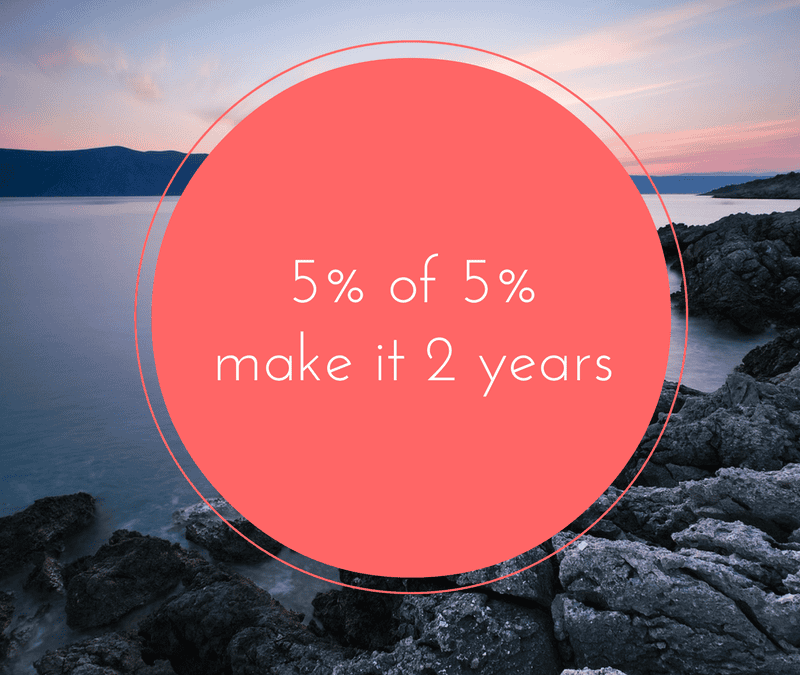
by Paul Churchill | Jan 20, 2017 | Blog, Early Sobriety, Helpful Tips, The first Year
I was in my first 72 hours of sobriety when Paul threw out the stat that only 5 percent of those who want to get sober will make it to 90 days. Of those 5 percent, only 5 percent will make it to 2 years without drinking alcohol. Let’s see… Okay, for every 1000 people who desire to get sober, 2.5 of them will be sober in two years. I’m not shaking anymore, but the acute effects of withdrawal have not left. My mind is in a fog, my skin has pinpricks running throughout, and I have not strung together more than a few hours of sleep in three days. By the time I hear this depressing stat, I realize that the easy fix to my discomfort would be to have a few drinks… and apparently, 1,997.5 people wouldn’t blame me. I’m not getting to sleep anytime soon. Maybe I’ll just keep listening.
I think we all know that hyper-vigilant friend who attaches themselves to a cause. There is the one who can string together why shopping at Wal-Mart is akin to feeding “The Corporate Antichrist”. They are loaded with information about the 6 Wal-Mart heirs making more money than the lowest 42 percent of the population combined. They’ll make a great case for corporation not paying living wages or providing decent healthcare and in turn, how our taxes subsidize government benefits, the services that could be provided by billionaires. If that didn’t get you, they’ll pepper you with the working conditions of the children in Polynesia so that you know the true cost of your three dollar Duck Dynasty tank top. They are not wrong. They have done their homework. In fact, you are persuaded to the point that you feel ashamed, stop shopping at Wal-Mart for a few days, and maybe even clumsily repeat the stats to a non-intellectual so as to stroke your newfound sense of self-righteousness. Problem is, within days those facts went fleeting. While appalled, you were not as committed as your friend. Your habits did not include the same degree of rigorous study, and in a moment of consumer relapse, you’re pulling once again to the parking lot ready to make an offering to the “Temple of Social Injustice”. You deny your first impulse to think it through. You certainly do not want to call your friend so he can feed you additional information. Let’s not ruin the day by feeling bad about making the easy choice. Besides, the sun is out and your guns are gonna look sweet in that tank top.
Yes, I am taking a dig at Wal-Mart. Pick any cause though… If we put the effort into learning about factory farming and the mistreatment of animals that are our food source, we would cringe and give pause to the effects of our consumption. Find out a few more facts about the mortality rates of the workers who assemble our smartphones and we are confronted with moral choices. The truth is, when it comes to these issues, we shop, consume, use, and abuse as a means to survive. We use the littlest amount of thought to procure the food, clothing, and technology to communicate. It is the basis for survival and we let the lizard portion of the brain do the thinking. Ease and value compete against taking a more difficult, long term approach that benefits everybody.
Now let’s be honest. How many of those inspirational, uncompromised, hyper-vigilant, cause oriented, intellectually sound, unwavering social renegades do we know? Not that many. Most of us slowly go the way of the buffalo which makes the impassioned moral minority pretty easy to spot. That minority friend, whatever their cause, is the rare bird that continually absorbs information, which in turn, informs their actions.
I was pretty discourage with that statistic that Paul relayed over my headset that night. I had no false sense that I was going to be in that minority of the first 5 percent, let alone in the second 5%. If I was involved in this human experiment called sobriety, there was no indicator from the last 10 years of alcohol abuse that I would succeed. I was all impulse and little intellect when it came to using alcohol.
I am close to 40 days sober. I have just gotten current with Recovery Elevator podcasts at episode 99. I started at Episode 00 and listened throughout the 40 days straight through. I am so thankful for the wealth of information and experiences that have been shared on the podcast. There is such a diverse amount of helpful experience in sobriety on the show. As I reflect on what might be the common source of success in everyone’s personal recovery program, it’s that the sober alcoholic is continually feeding the executive center of their brain. The AA attendant gets information and advice from a group share or a big book. The self-employed travels in a car with a podcast in the background. A mom finds a group to confide in and have a source reminder of a difficult past. Someone struggles with temptation, they get immediate advice from a Facebook Forum. In quiet times the recovering alcoholic finds books, websites and blogs. Information.
I do not have a rigid program for sobriety. My goals are to be 100% honest with my wife and accept her help, insight, and accountability. Second, it is to reprogram my doublemindedness with helpful and encouraging information daily. If the lizard portion of my brain is the quickest to respond and tell me that I need a drink to survive, I want the part of my brain that controls reason, behavior, and executive decision making to be full and ready to Giving Up Alcohol. I think it takes community and positive information.
At my core, I know who I am. I shop at Wal-Mart. I eat fast food. I own an IPhone. I am an alcoholic.
Ultimately, I want to be that annoying, hyper-vigilant friend when it comes to my alcoholism, but I now understand why so few will make it. The same impulse to eat, commune, and provide shelter the easiest way possible is the same impulse that beckons me to take that first drink. The difference today is, I understand that drinking is not a means for survival. It wants to destroy my future.
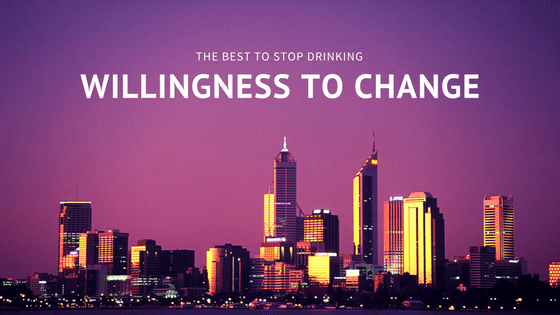
by Paul Churchill | Oct 26, 2016 | Blog, Helpful Tips
I have heard it said that to recover from an addiction, you need some intangible qualities. Among them are honesty, willingness, and an open-mind. These qualities may not come easily. They may only develop after you take some actions that you do not yet believe in, such as attending 12 step or other support meetings, listening to people you may once have shrugged off, or trying to practice a new set of principles. All these things usually are contrary to the nature of most alcoholics and addicts. Yet, I believe it is through action that you can also bring about a change in your outlook.
To recognize that you have a problem, you need to first be honest with yourself about your problem. Self-delusion is a roadblock that many addicts and alcoholics will stumble over. It prevents you from taking a good, reasonable look at your life and your circumstances. To remain self-deluded is to fool yourself into thinking you are perfectly fine, when in reality you are far from it. In so many instances, you are the last person who realizes you have a problem with substance abuse, and it is all too plain to see for everyone in your life. Getting honest with yourself about your using will allow you to begin to take steps toward recovery of your mind and body.
The open-mind then becomes a key trait. As you have become honest with yourself, you can then allow new ideas to filter in. Much like water flowing through a charcoal filter, it gets purified and the contaminants get removed. You are then able to grasp and see concepts that once would have been impossible. This all happens as your mind and body recover from your addiction. It takes time, and it is not easy, but it is attainable with effort.
Lastly, is willingness: for the alcoholic or addict, no real progress can be made in recovery until they are willing to change their behaviors and attitudes. Consistent sobriety may be hard or impossible to achieve without some degree of willingness. By being willing to take different actions and accept other viewpoints, you can then develop more honesty and a more open mind and thus grow as a person.
BIO:
Andy is a blogger for Step One Rehab. Through his writing, he attempts to raise awareness about addiction, substance abuse, and mental health issues. The goal of Step One Rehab is to match premium addiction treatment facilities with the needs of clients. Andy writes daily articles for Step One’s blog. To learn more, visit their website or check them out on Facebook, or Twitter.
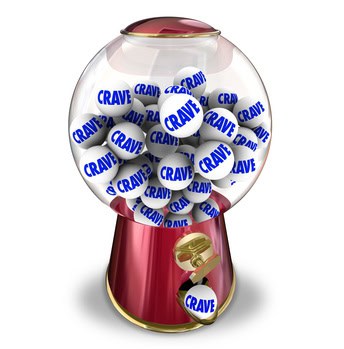
by wordpress | Nov 10, 2015 | Diet & Fitness, Early Sobriety, Helpful Tips
The brain sees sugar, opiates and alcohol in a similar way – as mechanisms to improve our moods and “take away the pain” from memories of our past and the current state of our lives. While many alcoholics have never concurrently abused other substances, it is not uncommon for us to hear someone in a 12-step meeting introduce him or herself as an “alcoholic/addict”. Let’s be clear – alcoholics ARE addicts. We are addicted to alcohol. We are compelled to drink. Whether we, as individuals, agree with researchers who say alcoholism is a mental disorder, or those who present evidence that alcoholism is a result of early childhood trauma, or that addictions are hereditary, until we accept that it is a problem in our lives and that we have to do something about it, all the “clean eating” and sugar purging will not matter.
Since you are reading this, I will assume you have made the decision to do something about your addiction and that you are concerned about the increase in your cravings for sweets. You want to change and there is a tendency to what to change everything all at once. This is why “quick fix” fitness and diet methods fail. You see, the mind needs at least 30 days to experience a change, another 30 to practice it, and then another 30 to see the beginning effects of the change and realize the change is sustainable. This is why in early recovery, if you try to stop drinking, stop eating sugar, start an exercise program, and cut out fatty foods all at once, your brain will likely not be able to process those changes and will reject them all.
In order to deal with your cravings, you really need to understand some key concepts of the recovery process. Basically, that your mind and body are connected. So, in order to solve the craving issues, you need to learn to let the emotions come, recognize changes as your body recovers, and begin to care for yourself.
Here are 5 key concepts that will help you with our cravings, your nutrition and your recovery, followed by some online resources:
- Feelings – You are so used to covering them up with alcohol that you may not recognize when you are hungry, emotional, or just tired. For one week, hone in on your feelings when you think you are hungry. If you have just eaten a meal, then drink some flavored water (lemons, limes, cucumbers). You may just be dehydrated, which is common when you consume large amounts of alcohol.
- Cravings – The minute you stopped drinking, your brain and body went on the hunt to replace the alcohol with something else. Sugar in all forms – white or raw granules, processed carbohydrates (donuts and cookies), candy (Snickers are my favorite), and fruit (even nature can give us a high) – can do for the brain what the alcohol used to. Unless you have blood sugar issues (diabetes), choosing a candy bar over a shot of whiskey is probably a better choice in early recovery. Eating an apple is even better.
- Nutrition – Your body has gotten used to replacing food with high caloric alcohol and low-quality food, especially if you spent so much money on drinking that you had less cash available to buy good food, and even less desire to cook for yourself. Once you have a week of zeroing in on your feelings and understanding when you are hungry, emotional or just tired, add raw or cooked veggies to at least one meal a day for a week. Even if it’s a can of corn or green beans, your body needs to start getting used to ingesting something other than sugar and alcohol.
- Time – The main reason my clients focus on their mindset during the first few weeks of one of my fitness/nutrition programs is because until they understand their feelings related to food and hunger, then practice mindful eating, and finally start buying healthier foods, they will not be ready to actually prepare and eat them. If you use the first 30 days of your journey to focus on not drinking, finding a method that will give you the tools you need for success (12-step program, therapy, treatment, etc.), and experience your feelings, you will be able to use the next 30-60 days getting the hang of eating better.
- Self-care – Eating well is part of taking care of yourself, but you also need to attend to your mind and body. If you have engaged in a program of some sort, you will undoubtedly be encouraged to use prayer and meditation in your daily routine. You may have continued to exercise while you were drinking – as a fitness professional, I certainly continued to train, although it did me little good while I was still pounding the beer. You may want to continue working out, but you may not have the energy or mindset to do so. Relax. Walk. Play with your kids. Or do nothing.
A word about supplementation – Although alcoholics tends to be deficient in a number of vitamins and minerals, the most common are Pyridoxine (Vitamin B6), Thiamine (Vitamin B1), and Folic Acid (Vitamin B Complex). While you could start taking over-the-counter supplements, you may not need them, thus pouring money down the toilet, both literally and figuratively. Ask your primary care provider about having a complete metabolic screen done to check for any deficiencies, and after the results are in, ask about dietary changes and supplementation. In case you’re curious about where the vitamins above occur naturally in food, here you go:
Vitamin B1 (Thiamine) is found in rice, egg noodles, meat (pork chops), seafood (trout, mussels, and tuna), black beans, and acorn squash.
Vitamin B6 (Pyridoxine) is found in chickpeas, meat (beef liver, chicken breast, and turkey), fish (tuna and salmon), starchy vegetables (potatoes), and bananas.
Vitamin B Complex (Folic Acid) is found naturally in leafy vegetables (spinach, broccoli, and lettuce), okra, asparagus, fruits (bananas, melons, and lemons) beans, yeast, mushrooms, meat (beef liver and kidney), orange juice, and tomato juice.
More resources:
Guided meditation – http://www.healthline.com/health/mental-health/top-meditation-iphone-android-apps#2
Nutrition in Recovery guides developed especially for the Recovery Elevator – (http://shellylarsonfitness.com/recoverynutrition
Nutrition resources used by my clients – (http://shellylarsonfitness.com/eat
Sobriety resources – https://www.recoveryelevator.com/resources
“One Size Does Not Fit All!” free webinar – http://shellylarsonfitness.com/webinar
*Disclaimer – Information provided in this post written by Shelly Larson, or in any other materials produced by the author, are for informational purposes only, and should not be construed as a substitute for medical advice. Please contact a qualified healthcare provider regarding matters of personal well being.
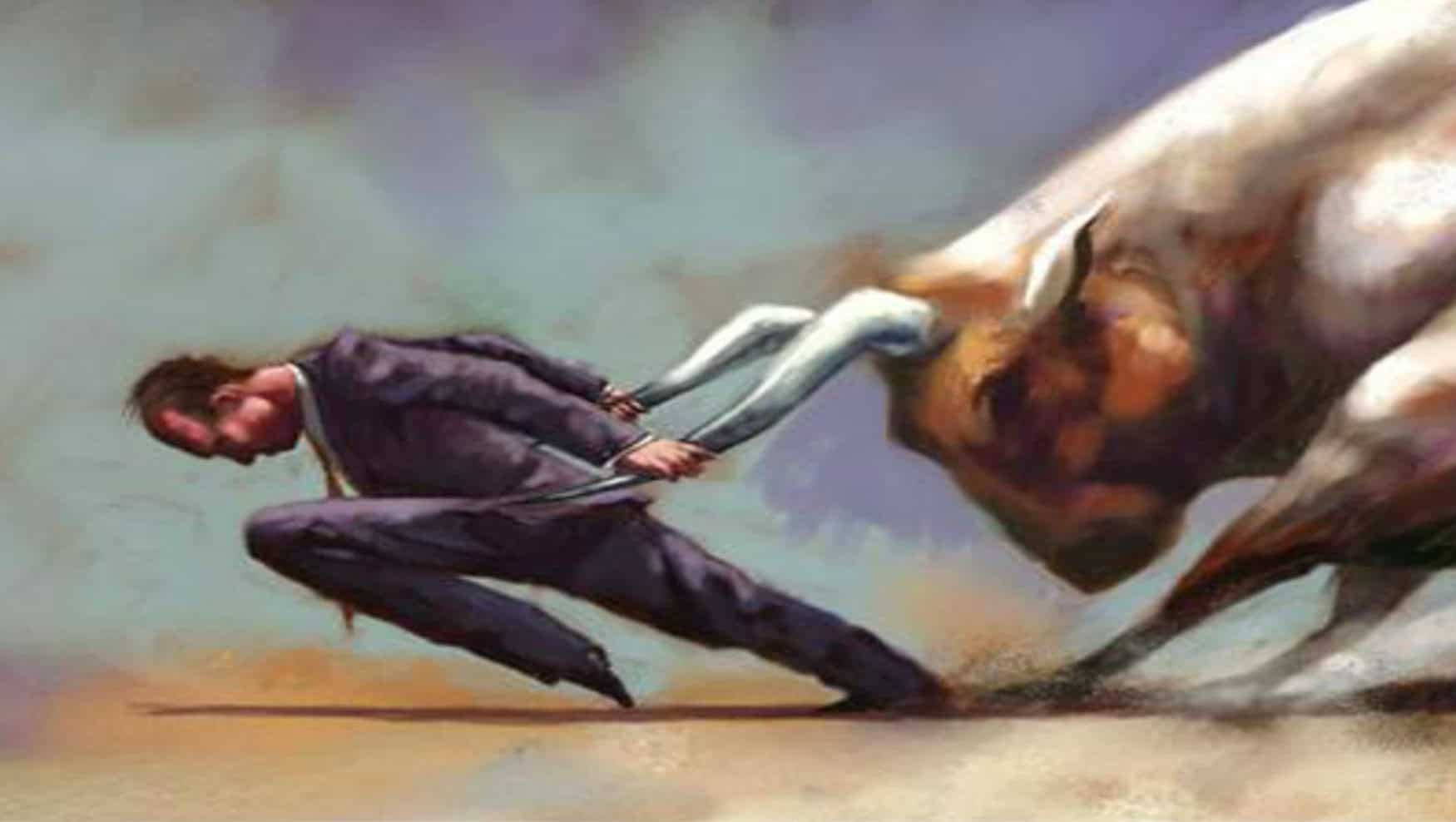
by Paul Churchill | Sep 3, 2015 | Early Sobriety, Expectations, Helpful Tips
As much as we learn “Let Go” in recovery we must learn to grab a hold of life by the,..well…grab life by the horns I guess. That’s what I’m focused on today – The Right Now-ness of Life. There have been plenty of days where I just la-de-da’d my way through “wearing life as a loose garment” being all, “I don’t have to worry, God’s got my back…, things will all work out.” And believe me, I’m not downing this – those are some very good ways to live a sober life however, there comes a time when you just have to get real, stand up straight and make things happen. Days when you just have to get the hell up, put on the big kid pants and charge at life like it was your last day on earth.
One thing I used to take solace in was saying, “I’m just waiting to see which way God leads me.”
Today, awaking with a breath of fire, I set out with determination. Today I will get things done – like I used to before I turned into a, well, let’s say, a less than highly productive member of society. I love days when I feel like this; motivated, full of energy, not willing to allow anything to get me down or hold me back. There’s so much to do!
Right now, in this moment, I absolutely love what I’m doing. I get to talk to cool people all over the states and the world who are all somehow related to addiction recovery. I get to write, which even though I may not be an award winner (yet), I write from the heart and it seems to make an impact, thus making me feel accomplished and useful. Walking into treatment, people are not typically feeling very good about themselves. There’s a lot of shame, guilt, regret and remorse. It takes a while before one is able to get over those things, but slowly confidence is regained and at least some of those things can be met face on. Facing some of these particular feelings are really hard. Shame is probably the single most powerful thing that holds addicts back from becoming truly well for the long-term.
Just to be clear, shame is something you feel about something you did, while guilt is about something you did to somebody else. Group Therapy can be extremely effective in making progress toward getting over these extremely negative roadblocks to recovery. Instead of ruminating on them, sorting them out, getting to the root, today I am just by-passing them. Deciding that they are of no use on my journey today has catapulted me into action. To me that is freedom.
Seems to me in some treatments and programs that a lot of negatives are focused upon only increasing shame and guilt. While in some cases this may be helpful to recognize the severity of a situation and responsibility for the damaging parts that are ours, I tend to agree that it’s all better to get over it all rather quickly. In this moment I feel like I just can’t have an albatross of regret hanging around my neck with a list of people I need to apologize to. These things will all come in their time. And one things that’s for sure, is that the world doesn’t slow down just because we decide to examine how awful we were in our past days of using. So here’s my point; don’t forget to live – TODAY. Catch your breath, feel better, clean up your act and get on with it. Do good things (you know what they are!) Be the change and make a difference. Today. NOW.








